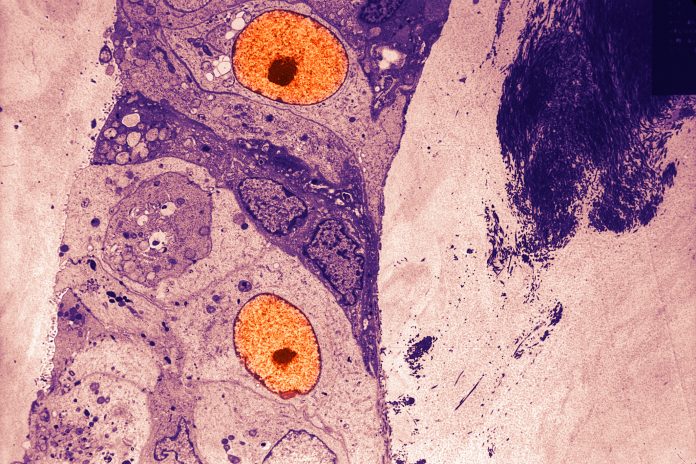
Researchers from the Baylor College of Medicine have discovered a potentially more effective treatment for a specific type of HER2 mutant metastatic breast cancer. In a study published in Cancer Research, they showed that the drug poziotinib, which is used for non-small cell lung cancer, reduced cancer growth and metastasis in cell studies and animal models.
Lobular type breast cancer—which represent about 10% to 15% of all breast cancers—with HER2 mutations typically respond to the pan-HER tyrosine kinase inhibitor (TKI) neratinib. Unfortunately, the responses are variable and short-lived. The Baylor team conducted their study to see if different HER2 mutations in breast cancer drove different responses to therapy.
The team first analyzed studies that sequenced the genes of human lobular and ductal breast cancers, focusing especially on mutations in the HER2 gene. “We studied every single mutation in both histological types of breast cancers,” explained senior author Shyam M. Kavuri assistant professor at Baylor’s Lester and Sue Smith Breast Center and the Department of Medicine. They observed one highly recurrent mutation, HER2 L755S, as a recurrent mutation in lobular cancers but not in ductal cancers. Those patients harboring that mutation showed significant reduced overall survival as compared to those with the non-mutated, or wild-type, HER2 mutation. None of the other mutations tested were associated with any significant differences, suggesting the HER L755S mutation is linked with aggressive lobular disease.
“That was our finding from the clinical perspective, but we wanted to understand the relevance of the mutation in the lab,” added Kavuri. The team introduced the HER L755S mutations in cell lines and in animal models and found that the HER2 L755S mutant cancer showed resistance to standard agents like for fulvestrant and neratinib. The animals with the mutation also developed metastasis more often.
“Even more interesting is that in the lobular models we showed that a very distinct early metastasis to the ovary which perfectly recapitulates the clinical phenotype of lobular patients,” said. “We never really understood why many of the patients we see with lobular breast cancer already have metastasis; we did not know what actually triggers that and here we show that this mutation directly induced ovary metastasis.”
The researchers next tested a variety of existing drugs to see if any had activity against HER2 mutation, including HER2 L755S. Their findings eventually focused on poziotinib, a highly potent tyrosine kinase inhibitor that inhibited tumor growth and metastases of all the HER2 mutations tested. “We have tested all of the HER2 mutations and poziotinib seems to be highly active in all,” said Kavuri. “We believe it should be tested in a Phase II clinical setting in patients with metastatic breast cancer patients harboring HER2 mutations.”
Poziotinib is used in the clinical setting for non-small cell lung cancer patients. “We already know a lot about its toxicity and tolerability, so this is a great example of making use of the knowledge we already have and repurpose it in ER-positive metastatic breast cancer patients harboring HER2 mutations,” added Kavuri.
The study also provides an alternative view of assessing the implications of HER2 mutations in metastatic breast cancer. “The cancers we studied were HER2 negative by FISH – a laboratory technique used to detect and locate a specific DNA sequence – but it was non-amplified meaning the mutation is only recorded in the HER2 gene,” said Kavuri. “The patients don’t have HER2 so they are considered HER2-negative by standard criteria.” The team selected cancers for inclusion in the study only if they were HER2-negative and then sequenced the cancer looking for HER2 mutations.
“In this study we went to a granular level to understand prognostic implications of HER2 mutations in the two histological breast cancer subtypes,” said Kavuri, adding that lobular breast cancers are harder to diagnose and often resistant to standard endocrine therapy drugs. He also believes it is an understudied histological subtype.
“About 11% of lobular patients have HER2 mutations in a metastatic setting,” concluded Kavuri. “So I think this study has a broader implications not just as a HER2 mutant ER-positive breast cancers, but particularly from the lobular perspective.”













